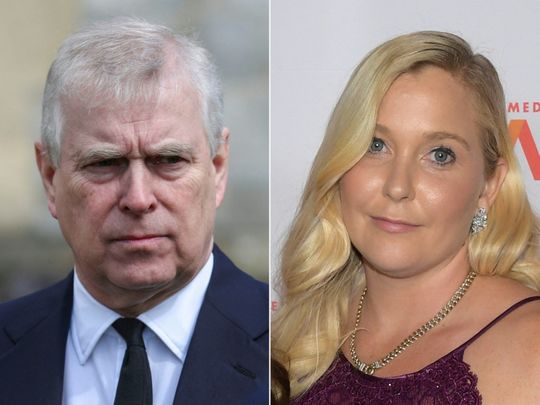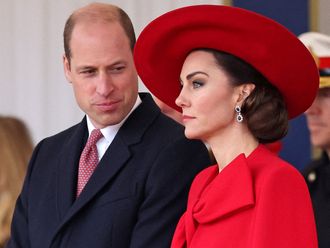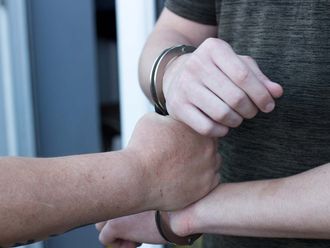
London: More than 150 veterans have signed an open letter calling for Queen Elizabeth to strip her son Prince Andrew of his military titles over his relationship with disgraced late US financier Jeffrey Epstein, the campaign group Republic said on Thursday.
A day after Andrew’s lawyers failed to persuade a US judge to dismiss Virginia Giuffre’s civil lawsuit against him which accuses the royal of sexually abusing her when she was a teenager, the anti-monarchy group released the letter from veterans angry that he still held honorary military roles.
Their letter to the 95-year-old monarch called for her to take immediate action because Andrew, the Duke of York, had been “uncooperative and less than truthful” about his relationship with Epstein, and had brought the armed services he represented into disrepute.
“We are particularly upset and angry that Prince Andrew remains a member of the armed forces and continues to hold military titles, positions and ranks, including that of Vice Admiral of the Royal Navy,” the letter said.
“We are therefore asking that you take immediate steps to strip Prince Andrew of all his military ranks and titles and, if necessary, that he be dishonourably discharged.” In a decision made public on Wednesday, U.S. District Judge Lewis Kaplan said Giuffre, 38, could pursue claims that Andrew battered her and intentionally caused her emotional distress while Epstein was trafficking her.
The 61-year-old prince, the queen’s second son, has denied Giuffre’s accusations that he forced her to have sex more than two decades ago at a London home of former Epstein associate Ghislaine Maxwell, and abused her at two Epstein properties.
The judge’s decision means Andrew could be forced to give evidence at a trial which could begin between September and December 2022 if no settlement were reached.
His legal team said on Thursday they would not be commenting on the development.
The prince was forced to step down from public duties in 2019 because of his connections to Epstein and in the wake of a disastrous BBC TV interview which he had hoped would clear his name, but instead led to ridicule and further questions.
“Regardless of the result of Virginia Giuffres civil case against Prince Andrew, his position in Britain’s armed forces is now untenable,” the veterans’ letter said.
Buckingham Palace said on Wednesday it would not comment on an ongoing legal matter.
What’s next in Prince Andrew?
Since the judge’s ruling dealt only with a few preliminary issues, there is a lot more ground to cover before the case gets to trial.
Andrew’s lawyers could appeal the ruling. They will have opportunities to try to get the case dismissed on other grounds.
As the case develops, the two sides must exchange potential evidence — such as emails, text messages and telephone records — and submit to depositions at which lawyers can question potential trial witnesses.
Giuffre has been through many such depositions before in lawsuits against Maxwell and other people, but Andrew has never been questioned about the matter under oath — something he may want to avoid at all costs.
Once the exchange of evidence concludes, defense lawyers often make a new request to toss out the case judging by what they’ve learned. The judge then makes rulings that may help lawyers understand the risks of going to trial.
Before trial, a judge rules on what evidence can be shown to a jury, giving lawyers another opportunity to assess their chances of scoring a victory before a jury.
Will the case get that far?
Maybe not.
Andrew has some incentives to settle the case quickly, rather than let Giuffre’s attorneys seek to question him under oath, which could cause him problems later.
Maxwell’s two 2016 depositions in a lawsuit Giuffre filed against her became the basis of criminal perjury charges that Manhattan federal prosecutors brought against her last year.
She was convicted of sex trafficking and conspiracy late last month but has yet to stand trial for perjury. Prosecutors have agreed to drop the perjury charges if her trafficking case goes to sentencing this year.
Andrew is also likely facing enormous pressure to settle to avoid sensational headlines that damage the reputation of the royal family. The negative headlines generated by the case may be seen as more costly than a settlement.
Any such deal would probably not elicit any admission of guilt or accountability.
The likely outcome
Absent an outright dismissal, most civil litigation in the US ends in some sort of settlement. Dozens of women, for example, have filed lawsuits against Epstein and onetime movie mogul Harvey Weinstein.
None so far have resulted in a trial.











